"Her talent as a songwriter equals—if not surpasses—her vocal gifts. She has an uncanny way of cutting to the heart of a topic and providing the listener with food for thought."
Billboard Magazine Tweet
Jan Krist is a singer-songwriter from Detroit who lives in Fort Wayne, Indiana. She is also a visual artist, painting as well as working in clay. Jan teaches art and music to adults with developmental disabilities. Interviewed by Cynthia O’Brien—minister, musician, and Braver Angels debate chair.
Follow Jan’s journey by visiting her website (where you can sign up for her mailing list!) or by liking her Facebook page. You can also listen to her work on Spotify, Apple Music, and YouTube.
Background
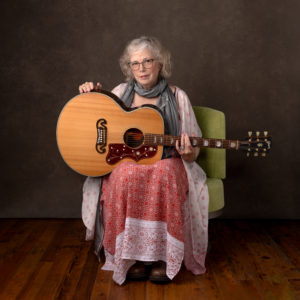 Cynthia O’Brien: How did you get into music?
Cynthia O’Brien: How did you get into music?
Jan Krist: When I was 15, I saw Marshall Crenshaw and his trio play “Uncle John’s Band” at the junior high assembly. There was also a girl named Amy Fong who played “Suzanne” by Leonard Cohen. I thought, “I need this in my life.” I just had to have a guitar after I saw them and heard them sing.
My father had died just months before, and that began the process of begging my mother for a guitar. She wouldn’t buy one for me until I proved I was serious about it and saved up $50 to put toward it. Once I had it, I learned three chords and started to write. I didn’t know that was not what everybody did. I just assumed that everybody wrote songs.
Once I had a guitar, I learned three chords and started to write. I didn’t know that was not what everybody did. I just assumed that everybody wrote songs.
Jan Krist Tweet
CO: What are the origins of your political beliefs?
JK: I inherited them from my mom and from my father’s mother, who was a Grey Panther.
My mom had been working and paying the bills while my dad went from one illness to another. When he died, she found herself in a really weird situation where any financial credit she had built with my dad was suddenly defunct; it had gone with him. My mom became very adamant about women’s rights. She was extremely vocal about it and wanted to make sure that my sister and I understood what the stakes were.
She was also generous. Even when we were in dire straits financially, she helped other people. A guy came to the door looking for work. He said, “I’ll take down this tree for you. I’ll charge you 25 bucks.” That’s a lot of money to a widow in 1969, a single mother of four, but my mom was really concerned about him and his ability to feed his family, so she said “Yes, go ahead and do it and I’ll write you a check.”
The woman next door was in bad shape, also a single mother with kids. My mom said, “I don’t have much, but I’ll pay you 25 cents a shirt if you’ll do the ironing for us, and that will give you something.” She saw need around her and she responded.
My grandma on my dad’s side was a Gray Panther and a foster grandparent. She marched on Lansing, Michigan, at the age of 87. She had a lot to say about the disabled and their needs, and how we were not meeting those needs. She used to work seven days a week at a home run by the state, as a volunteer, so she could take care of her charges. She knew the facility was understaffed, and she wanted to make sure the children she cared for got the time and attention they needed. She would also piece a quilt each year and auction off when she held her foster grandparents fundraiser each year. She raised thousands to support the program.
Deep Dive
CO: What are the issues you care about?
JK: I care about issues of peace and justice. I have marched and attended a number of protests such as anti-war protests before the Gulf War, and in the lead up to the wars in Afghanistan and Iraq. I have attended candlelight vigils at the courthouse here in Fort Wayne in support of the rights of the LGBTQ community, and I marched in support of Christine Blasey Ford during the time of her testimony before the Judiciary Committee. I also attended the Women’s March on Washington when Donald Trump was elected in 2016. I have held and hosted numerous fundraisers for women’s shelters in Detroit, and for years I held an annual fundraiser for a mission to families in Hamtramck, Michigan, which provided holiday gifts for teens.
I care deeply about women’s rights and women’s issues, and I have used my art and my music to say that we need to listen when a woman says a man was abusive. Women have been silenced, shamed, shut up and shut down.
One day I posted a question on Facebook: How many of you women have been accosted, had a man grab you without any provocation, just walking down the street? By the end of the night, 100 women had responded to me.
Trying to help women have their voices heard is really important to me, especially in places where their voices are not heard, like in political circles. Yes, there are women senators, but there are fewer women than men, and even fewer in the Republican Party.
CO: How have you addressed these issues through art?
JK: Two years ago, I did a whole art series where I made coffee cups and etched the stories of a number of my friends—rape stories—into the clay while it was still wet. I chose coffee cups as the vehicle for the stories because often it was over coffee that these stories tumbled out. Over coffee, everybody starts to relax, you start to share, things get more intimate, and someone will say, I was attacked, or I was raped.
One friend told me her father had sexually molested her from the time she was in her crib. Her father was a sergeant in the Detroit Police Department. Another told me how when she was separated from her husband she was violently raped in her bed and beaten. She came to with her toddler tugging on her bed sheets, asking for breakfast. She got up, fed her children, took a shower and just worked all day. She never was emotionally able to do anything about it. It’s not uncommon for a woman to keep these things a secret. They don’t say anything; they’re used to not being heard. I always feel like women’s rights vary from house to house. We don’t have any unity on this subject because our experiences are so different house to house. For me, things are good, and my husband treats me like a partner, but maybe next door things are not so good.
I made 15 of those cups, then the pandemic hit. I didn’t get to display them. However, last spring when things opened up a bit, we had friends come for a weekend. My friend’s wife picked up a cup and took a deeper look at it. She dropped into a chair and said, “Oh, my God. Can I tell you what happened to me?” Tears were streaming down her face. Anyway, I was going to make a coffee table and put the cups on the coffee table and invite people to pick them up and read them. My hope was to also have a stack of paper cups with sharpies nearby, and invite people to add their own cup to the table.
I’ve always been a visual artist. My songs are a collection of images. A writer once wanted me to play Boggle with him. He said, “You’re a wordsmith; you’ll love it.” I’m not a wordsmith. I’m an artist. I use words like brushes to create images. It seemed natural to illustrate the songs. When I was playing songs for the first time and I needed a cheat sheet, I would just draw a bunch of pictures as shorthand, and read them like lyrics.
Two years ago, I did a whole art series where I made coffee cups and etched the stories of a number of my friends—rape stories—into the clay while it was still wet. I chose coffee cups as the vehicle for the stories because often it was over coffee that these stories tumbled out. Over coffee, everybody starts to relax, you start to share, things get more intimate.
Jan Krist Tweet
CO: How do your life experiences influence your songs?
JK: I wrote “Someone” when I was living in Detroit. I had two children, and our neighborhood was kind of disastrous. One day, my neighbor was walking to the store with her seven-year-old when she was shot in the head and killed. He watched his mom go down. There was an arsonist on the block who would steal cars and light them on fire. He burned down several houses on the block, including his mother’s house. It was against this backdrop, being in the thick of it, that I had to walk to the store with my children. I got home safe, but it could have been us.
I had to figure out what to do with all of that tension. Songwriting was one of the things I did. Detroit at that time was the number one murder capital of the nation. Statistics are cartoonish, but when you’re in it, when you feel the fear and dread and smell the smoke, it’s a different thing.
CO: Do you know whether any of your songs have changed anyone’s mind?
JK: “Holy Wars and Politicians” was written in the lead up to Desert Storm. I think it probably was a reaction to hearing people talk about it as a holy war. Preachers were saying it would be patriotic to stand with George Bush. I didn’t appreciate the way the church was being used by politicians to sell war.
I sang that song at Cornerstone Festival on the main stage on the Fourth of July. I could only sing one song, so I thought I’d make it count. A person came to my show later that day and said, “You know, I wasn’t sure what to think when you got up and sang ‘Holy Wars and Politicians.’ I was in full support of this war, and now, after listening to your song, and after hearing some of your other music and things you said, I’ve changed my mind about this whole thing.”
I used to think people made bad decisions because they didn’t have all the information. If they just knew the facts, they’d change their minds. It didn’t occur to me that people had “alternative facts.”
Now when I write, it’s a whole different thing. I don’t have the same sense that people are really listening or want to hear information. I don’t think people are as open to changing their mind.
Quick Takes
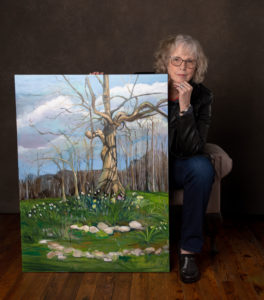 CO: You were a panelist at a recent online Braver Angels debate. How was that experience for you?
CO: You were a panelist at a recent online Braver Angels debate. How was that experience for you?
Watch the debate: Does America Need Another Revolution?
JK: It was good to listen. I was pleased to see that people who didn’t agree with me were still willing to listen to what I had to say. That’s a start.
I’m concerned about this attitude people have where they cut each other off and are mean-spirited and ugly to each other. The two sides operate in the same way that a bad marriage does, talking at each other. The U.S. can’t get divorced, so you guys are like marriage therapy for liberals and conservatives.
CO: You are a mentor to many songwriters. What does it mean to you to teach songwriting?
JK: I love teaching songwriting, in part because it has introduced me to so many other women who write. I have men as students, too, but especially for women, I have the chance to mentor them and try to instill in them how worthy they are. I say the same thing to them that I would say to myself: “Don’t be so hard on yourself. Give yourself a chance and step out.” It is enormous for me to be able to empower other women to go where they need to go, be who they are, and do what they need to do, and that’s part of teaching songwriting—acknowledging the gifts and callings within us.
What's Next?
CO: What would you advise musicians who want to help the nation now?
JK: You’ve heard the phrase, “Beauty will save the world.” I’m not always sure I agree, but I think it’s a really good place to start. If you start with something ugly, you’ll just get a door slammed in your face. When you share something beautiful with someone, you begin to open the door. I say a lot of hard things in my songs, but I try to do it in a way that it’s introduced through beauty.
Art rises up out of who we are and what we experience and how our lives play out against the times that we’re in.
CO: What does the immediate future hold for you?
JK: I don’t see myself playing out, but I do see myself continuing to write and do art. I feel that I’m supposed to present a sense of hope for people on either side of that political dividing line, and to do this in a way that responds to my times and grows out of the life that I have been given.

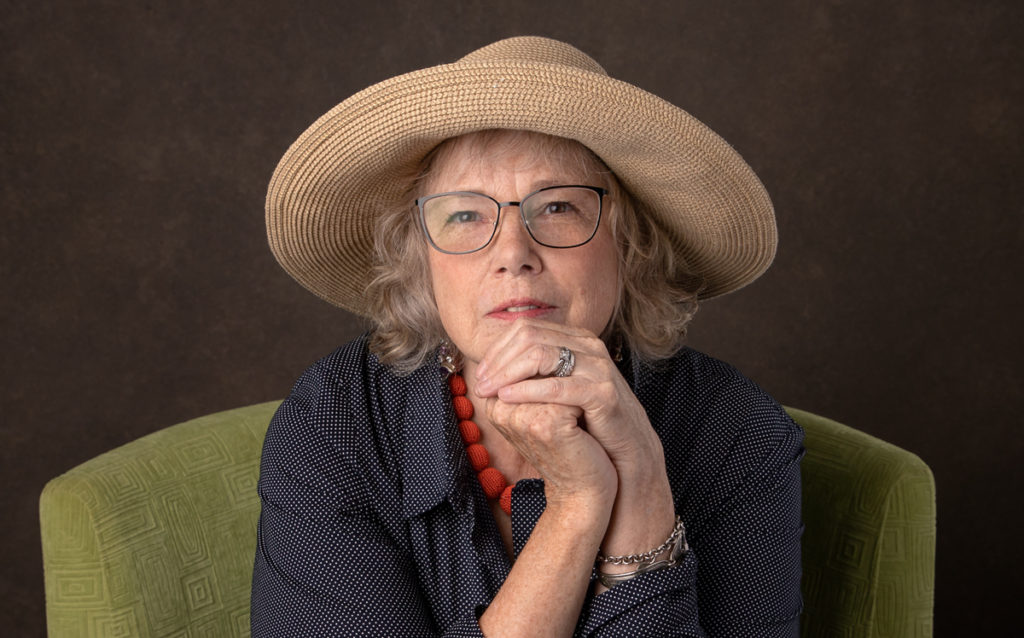
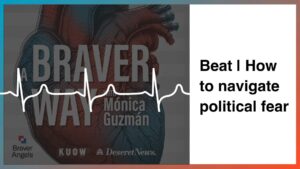
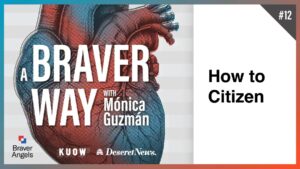

1 thought on “Artist of the Month: Jan Krist”
I believe I have an older painting of Jan Kirst that was on the wall of the home I grew up in. I’m 70 now, to give you an idea of it’s age.
It has farm buildings it it and measures about 15 by 11 inches.
I’m not sure I have the correct Artist.
londondan@sympatico.ca